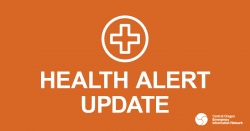Tips for maintaining mental and emotional health during crisis
Health officials are urging residents to do their best to remain calm and address their mental health needs during the COVID-19 outbreak, while acknowledging that feelings of anxiety and stress are normal.
Social distancing is critical to physical health, both for individuals and to protect the health of our community and our frontline responders. But mental health professionals suggest that it’s important to continue to make safe social connections at this time. Safe connections might include: regular phone calls, group texts, FaceTime, email, going on walks with household family members, time with a family pet and more.
“We know that the psychological impact of social isolation during pandemics is wide-ranging and substantial and can include depression, misuse of drugs and alcohol, and other serious effects, especially for some at-risk populations” said Dr. Wil Berry, psychiatrist with Deschutes County. “There are, however, ways to mitigate these issues and opportunities for loved ones to offer support during these times.”
Individuals seeking help or connection to resources can reach out to the COVID-19 hotline - 541-699-5109 - Monday to Friday, 8 a.m. to 5 p.m.
Professionals from Deschutes County Behavioral Health offered the following tips for managing stress and anxiety:
- Take care of yourself: Get enough sleep, eat healthy, exercise.
- Talk to others: Feelings of anxiety are normal in a situation like this. Reach out and talk to people in your community who can provide support.
- Avoid rumors and inaccurate information: Rely on official sources for information, including Deschutes County for countywide updates: www.deschutes.org/covid19; Oregon Health Authority for statewide updates: www.healthoregon.org/coronavirus; Centers for Disease Control for nationwide updates: www.cdc.gov/covid19.
- Do what you can: Even when some things are out of our controls, there are always things that we as individuals and communities can control.
- Wash your hands often.
- Avoid close contact with people who are sick.
- Avoid touching your eyes, nose and mouth.
- Stay home when you are sick.
- Cover your cough or sneeze with a tissue, then throw the tissue in the trash.
- Clean and disinfect frequently touched objects and surfaces.
- Ask for help: Local residents can reach out 24-hours-a-day to area crisis lines: Deschutes County 800-875-7364; Crook County 541-323-5530; and Jefferson County 541-475-4822.
- Seek help if you’re struggling with persistent inability to sleep, increasing drug or alcohol use, an overwhelming sense of depression or panic, urges to harm yourself or others, or an inability to take care of yourself or those who depend on you. Please do not call 911 unless you’re experiencing a medical emergency. Instead, call a crisis line or the nonemergency COVID-19 info line at 541-699-5109.
- Reminder: Taking precautions is altruistic. When we remind ourselves that others are benefitting from our actions, it makes sacrifices easier to bear. By staying home and taking precautions, we are helping to keep vulnerable populations safe and supporting our frontline responders.
Tips for parents
- Remain calm and reassuring: If true, emphasize to your children that they and your family are fine.
- Make yourself available: Let your children talk and give them plenty of time and attention.
- Talk to children in language they can understand: The CDC suggests telling children that, from what doctors have seen so far, most kids aren’t getting very sick. In fact, most people who have gotten COVID-19 haven’t gotten very sick. Only a small group have had serious problems. Keep the conversation going. Make time to check in regularly as the situation develops. Take cues from your child if they become afraid or overwhelmed offer comfort. If you need help, seek professional health.
- Avoid language that stigmatizes or assigns blame: Remind children that viruses can make anyone sick, regardless of a person’s race, ethnicity or national origin.
- Monitor television viewing and social media: Try to limit children’s exposure to media and talk about what they are seeing. Use only reliable sources of information.
- Maintain healthy behaviors and household routines: Serve nutritious meals, encourage adequate sleep and exercise, and maintain household routines to the extent possible.
- Teach strategies to prevent infection: Remind children to wash their hands with soap and water for 20 seconds (or the length of two “Happy Birthday” songs) when they come in from outside, before they eat, and after blowing their nose, coughing, sneezing, or using the bathroom.
- Find more info: http://bit.ly/COVID19-TipsForParents
ABOUT COEIN
COEIN’s website, www.coemergencyinfo.blogspot.com provides a collective resource for up-to-date information. Access to accurate, timely information both locally and nationally is encouraged. Our County Public Health experts point to the Oregon Health Authority and the Centers for Disease Control and Prevention as good sources of information.
Daily situation updates are available via email at http://bit.ly/COVID19UPDATES
Central Oregon Emergency Information Network (COEIN), includes Deschutes County Health Services, Deschutes County Sheriff’s Office, St. Charles Health System, Crook County Health Department, Crook County Sheriff’s Office, Jefferson County Health Department, Jefferson County Sheriff’s Department, tri-county public schools, City of Bend, Bend Police, Bend Fire & Rescue, and others. COEIN’s purpose is to collect, coordinate and distribute timely and accurate information.
Accommodation Information for People with Disabilities
To obtain this information in an alternate format such as Braille, large print, electronic formats, etc. please contact the COEIN JIC at 541.316.0087 or centraloregoninfo@gmail.com.
News Release Issued: March 20, 2020

